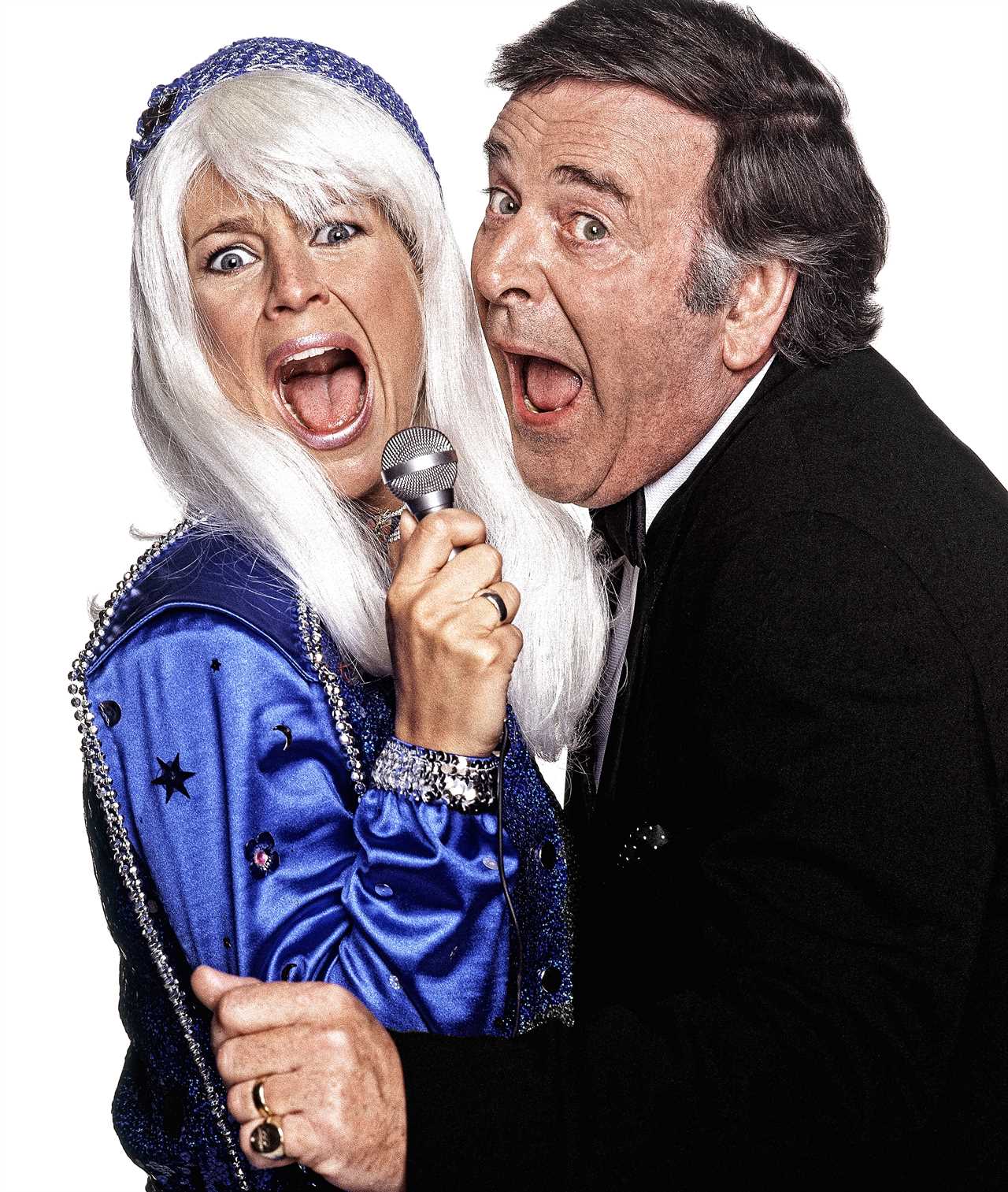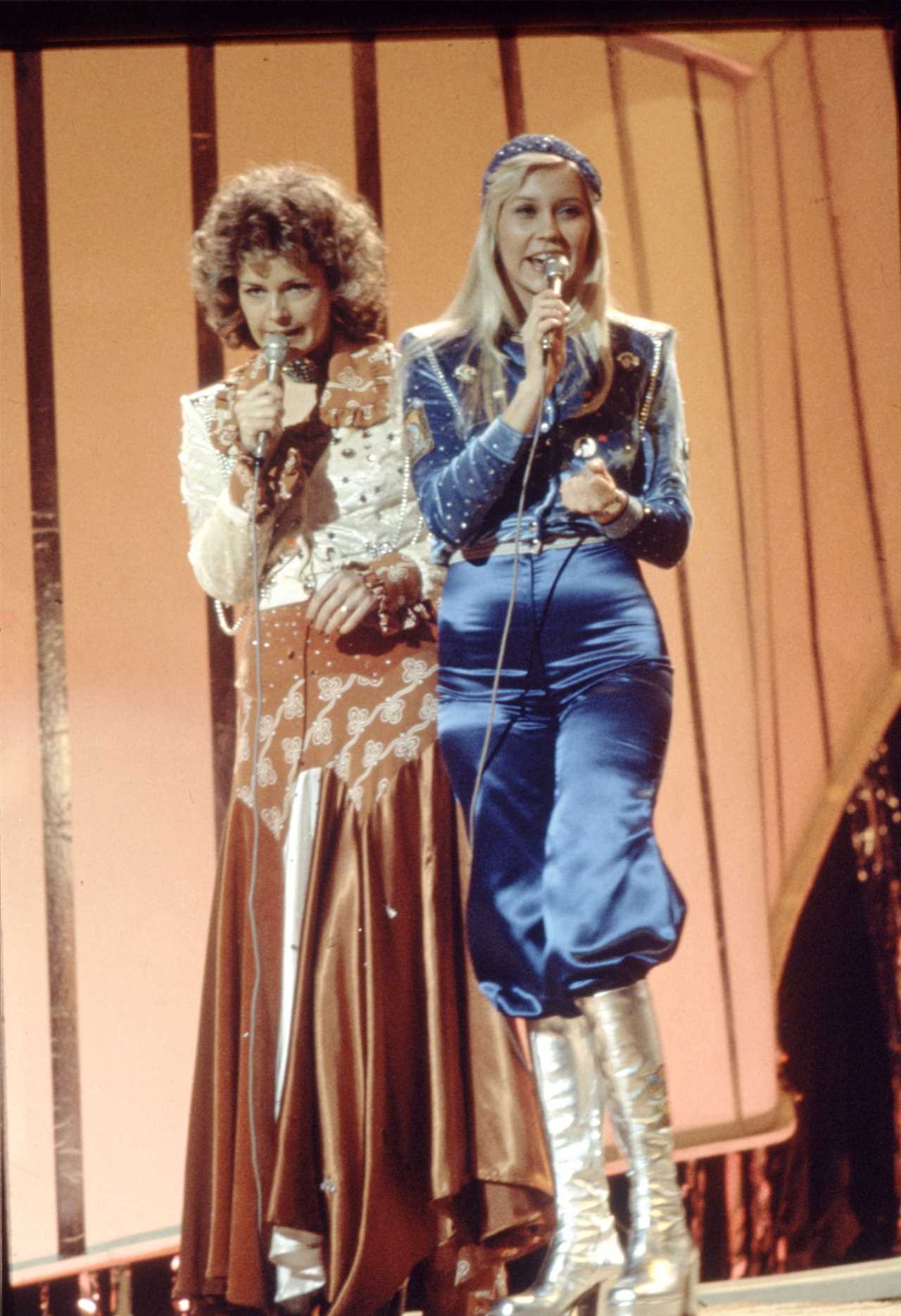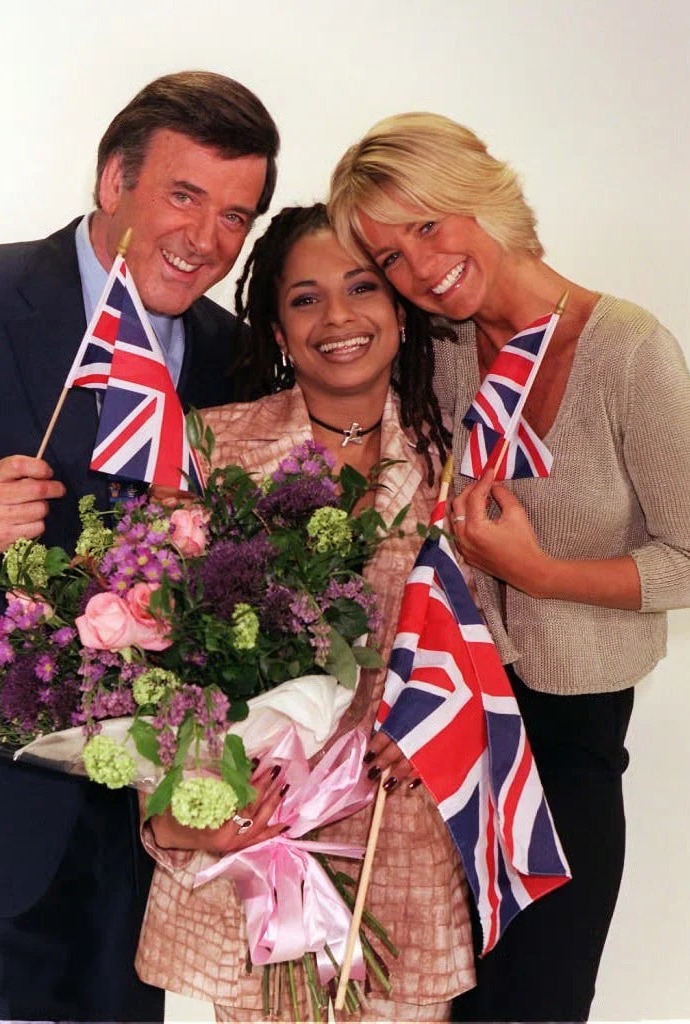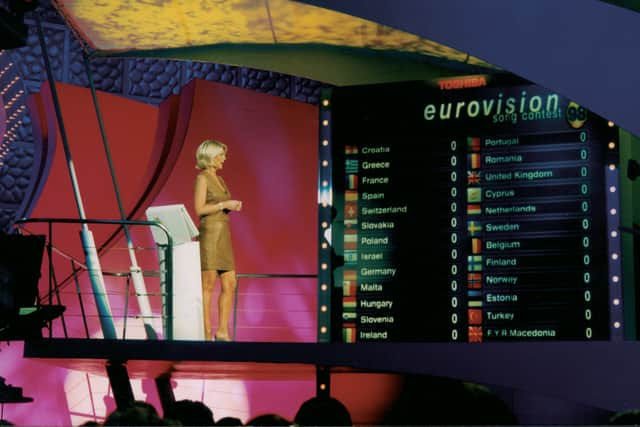IT’S 1998 and I’m in a BBC executive’s office discussing future projects that might be interesting to me.
I can only think of one thing: Eurovision.

Ulrika Jonsson hosted the Eurovision in 1998 from Birmingham with Terry Wogan

Ulrika was watching on TV when Abba won the contest for Sweden in 1974

Ulrika poses with Terry and UK entry Imaani
The kitsch and glitz, spectacle and hysteria — all in the name of Europop.
As an atheist child of Scandinavia, Eurovision somehow became my religion.
The Swedes become hysterical in the way only a subdued northern European nation can, 12 months before the event itself.
They broadcast the performances of all those hoping to represent the country months in advance of the international show.
The competition is fierce and opinion is hot on everyone’s lips in the run-up.
Maybe it’s the bright, colourful ridiculousness of the whole pageant that brings the Swedes out of their long, cold, dark winter hibernation, but it’s like the whole nation is on heat.
Essentially, Eurovision is the most phenomenal celebration of all things bright and beautiful.
In 1974, I was a girl of seven sitting in front of the TV in some dull, run-of-the-mill housing estate in the suburbs of Stockholm, watching Abba — my people from my country — in all their sequins and platform boots, lift the trophy in Brighton and bring the Eurovision title home, to me.
Twenty-four years later, the show was coming to the UK courtesy of Katrina And The Waves having been victorious the year before and I couldn’t think of anyone keener than me to host it.
To my surprise, I got the gig — alongside, of course, the legend himself, the late Sir Terry Wogan.
What an insane privilege.
This wasn’t going to be just any kind of job. This was a global broadcast, reaching squillions of viewers; a truly magnificent feat of engineering and technology — and it was going to be LIVE.
It felt to me like the most important job of my life and, to that end, I wanted to ensure that my tiny little, blonde, Swedish mind would be as sharp as it possibly could be, so I gave up alcohol in the three-month run-up to the event.
It might seem like a bizarre thing to do but there was a lot weighing on my performance.
There was a lot to concentrate on and I wanted to do Sweden, the UK and Eurovision proud.
While the sense of responsibility was enormous, I knew full well that I wasn’t the star of the show — and nor really was Terry.
It was the extravaganza itself and all the international performers.
I was merely a conduit — a cog in the wheel of the magnificent, splendiferous Eurovision.
In preparation, I went to countless BBC meetings with producers and directors.
I can’t deny I was, at times, overwhelmed by imposter syndrome and couldn’t escape the feeling that I was, in fact, still auditioning for the role with every day that passed.
I was handed reams and reams of research and facts about the history of the programme.
I recall attending rehearsal after rehearsal in some basement at the BBC where I was tested on the countries’ names — how to pronounce them and say the relevant bits in French.
It was relentless but I thrived on it.
It was a huge test of professionalism, language, presenting, setting the right tone, knowing what could and what couldn’t be said, what to do in the event of any number of technical glitches, being made aware of Eurovision politics.
In short, immersing myself in all things European.
It’s a huge technological under- taking, which was, of course, the reason the show was invented in the first place by the European Broadcasting Union in 1956.
Extraordinary, really, to think it’s going stronger than ever some 67 years later.
And with every year that passes the show gets bigger and bigger.
More and more countries are taking part. Who even knew that Australia was in Europe? But there you go.
Back in 1998, we were in Birmingham.
I was up there a week before the show rehearsing, meeting participants, doing Press interviews and generally soaking up the electric atmosphere.
The rehearsals were long and exhausting because they were inevitably not without their stops and starts.
The day of the first dress rehearsals, I was invited to lunch by the wonderful Terry and a couple of other people.
Sir Terry loved his food and his wine and it was just amazing to be in his company.
He was witty, kind and inspirational but also deeply caring and relaxed.
So relaxed, in fact, that he didn’t bother going to the rehearsal that afternoon because, quite frankly, he probably didn’t need to.
I, on the other hand, was keen to rehearse as much as possible.
You really have to keep your wits about you, know exactly what to say if a line goes down or there is a technical issue.
It’s not just getting dolled up and reading an autocue.
The atmosphere in Eurovision is so distinct and palpable that it is impossible to articulate it in words. It’s incomparable.
There’s a crew of thousands — lights, cameras, music and people speaking a thousand different languages.
You might think of it as peak Europop, but it’s actually very rock ’n’ roll.
For the show itself, you’re not only listening to people babble in your earpiece but you’re keeping an eye out on your surroundings and a very keen eye on the head of the European Broadcasting Union.
In my time that was a lady, a bit like a headmistress, who had the power to stop the show at any given moment or reprimand anyone for not adhering to the strict rules.
In general, I didn’t feel too nervous as such, but I was quietly terrified of her.
I didn’t feel my career depended on this unrivalled job.
I felt confident about what was being asked of me and I knew it would be unlikely I’d ever be given an opportunity like it again, so I told myself to really lap up the atmosphere and enjoy every moment.
And I really did.

Ulrika told herself to lap up the atmosphere and enjoy every moment of hosting
It’s easy to walk on to the biggest stage of your life when Terry Wogan is welcoming you with open arms. I was nothing without him.
He was an absolute joy to work with — not an ounce of diva about him, not an arrogant bone in his body. Just kindness and support.
You can rehearse all you like, of course, but when you’re going live to hundreds of millions of viewers and standing in front of an audience that is not only on fire but is utterly consumed by their Eurovision religion, you never know what might happen.
Anyway, it all went swimmingly in 1998, apart from one tiny blip when the Dutch announcer, a mature lady, said she had once taken part in Eurovision and I foolishly said: “Oh, a long time ago?”
When winner Dana International — the first transgender victor — was announced, panic set in and Terry and I desperately had to fill as she didn’t come to the stage to collect her award.
She was too busy lording it about backstage.
That’s the thing with so many of the performers — they’re so self-obsessed and living in that moment that they just forget what they’re doing.
Afterwards, even though I had spent hours on stage presenting, when I was finally able to have a drink, I wasn’t allowed.
The security guard at the after-show party wouldn’t let me in because I’d left my accreditation in my handbag.
But it’s nothing short of insane to be part of the Eurovision. It’s SO extra.
It’s organised madness. It’s passion and hysteria, furore and trepidation, all wrapped up in a few hours of live broadcasting.
The crews and teams are utter professionals so there was never a moment where I felt I didn’t know what was happening.
From what I can see, just like Birmingham, the city of Liverpool is pulling out all the stops and giving everyone the very best of times and the very best of impressions of their amazing city.
This year, there is a bevy of presenters sharing the task of hosting.
Times they are a changing, and it feels like this show is now bigger than an Irishman and a Swede taking it in turns to announce the nul points.
So much has changed in the 25 years since I earned my place on that stage.
The show is bigger and more ambitious than ever, there’s social media and the chance to watch the semi-finals on TV, too.
It looks great and I know it will be awesome.
Personally, I look forward to watching it from the comfort of my living room on Saturday night without having to fret about mispronouncing names or, God forbid, numbers.
Or even inadvertently making disparaging remarks to someone on the other end of the line.

Ulrika said: ‘As an atheist child of Scandinavia, Eurovision somehow became my religion’
Did you miss our previous article...
https://thecelebreport.com/television/masterchef-fans-slam-crying-contestant-as-john-torode-praises-dish






